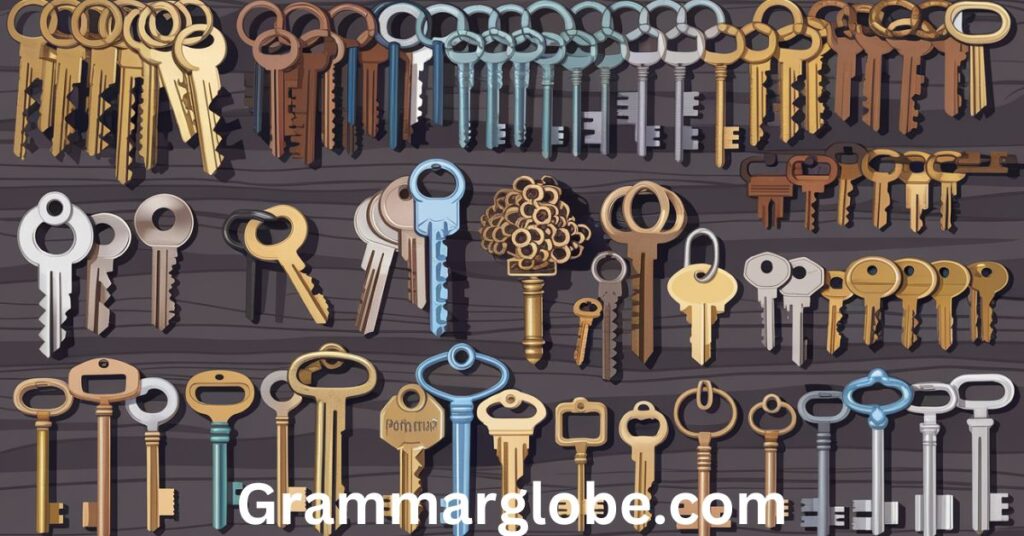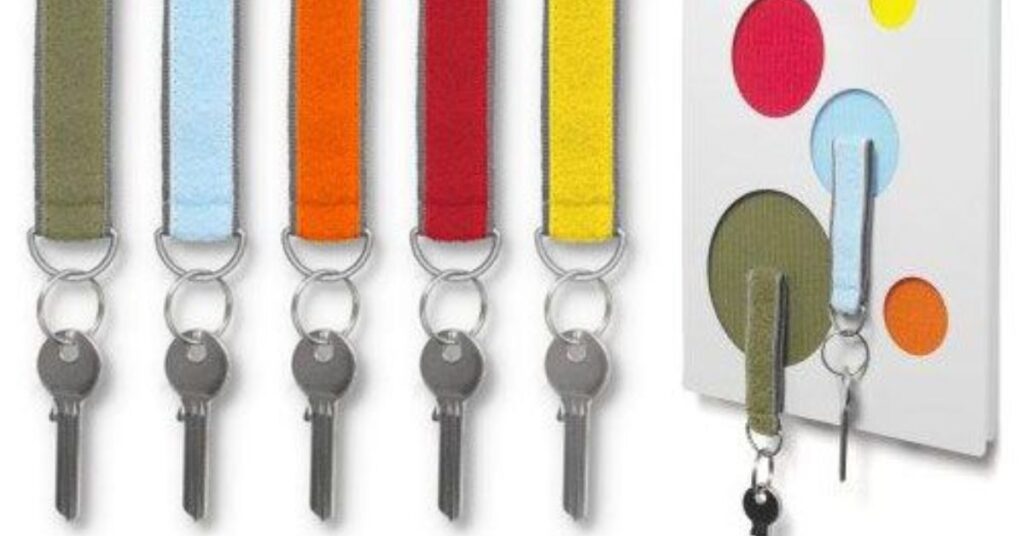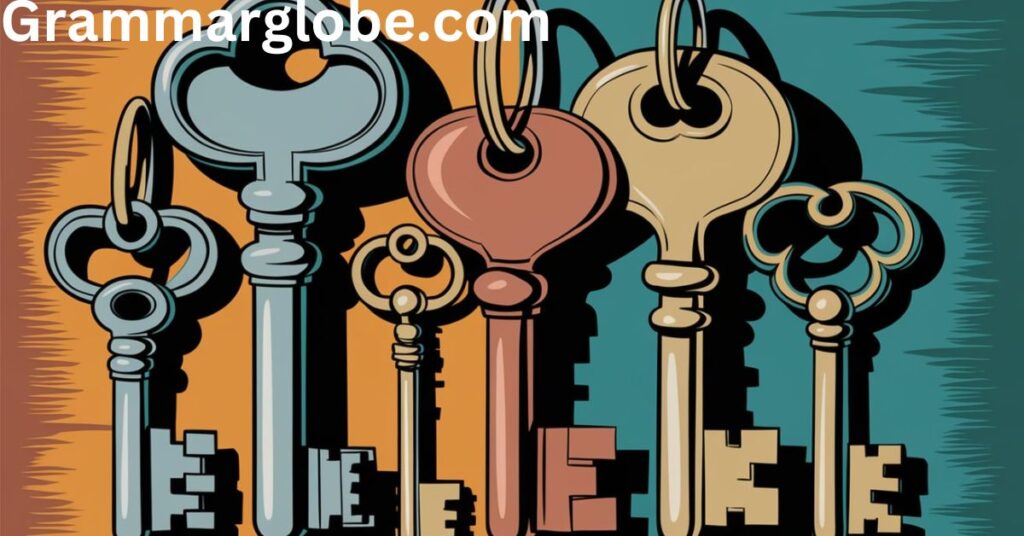Keys are fascinating objects—not just because they unlock doors, but also because they open discussions about language, history, and symbolism. When you have multiple keys, what do you call them? You might have heard terms like “bunch of keys” or “set of keys,” but there’s more to this story than meets the eye. In this article, we’ll explore the Collective Noun for Keys, delving into its linguistic roots, common usages, and cultural significance.
Collective nouns aren’t just functional—they’re deeply tied to how we organize our thoughts and describe the world. From organized groupings to casual phrases, the way we group keys reflects both language comprehension and cultural nuances. Let’s explore the collective nouns for keys, their context/usage, and the symbolism they hold in language.
Common Collective Nouns for Keys

Collective Nouns for Key When it comes to keys, the English language provides several options, each tailored to specific scenarios or contexts. Here are the most common collective nouns:
- Bunch of Keys: A casual term for a handful of keys grouped together.
- Set of Keys: Refers to keys organized for a specific purpose.
- Ring of Keys: A visual and functional descriptor.
- Bundle of Keys: Indicates a loosely grouped collection.
These terms allow us to describe key groupings with precision, whether we’re talking about a janitor’s tools or an ancient chest of treasures.\
See Also: Totalling or Totaling: Which Spelling to Use?Table: Collective Nouns for Keys
The following table organizes collective nouns for keys, providing their meanings and practical examples:
| Collective Noun | Description | Example Sentence |
|---|---|---|
| Bunch of Keys | Casual grouping of keys. | “She handed me a bunch of keys to the storage lockers.” |
| Set of Keys | Organized keys for specific purposes. | “The office manager distributed a set of keys for each desk.” |
| Ring of Keys | Keys attached to a circular holder. | “The janitor’s ring of keys jangled as he walked.” |
| Bundle of Keys | Loosely grouped collection. | “The archaeologist found a bundle of keys tied with twine.” |
Bunch of Keys: A Casual Way to Refer to Multiple Keys
The term bunch of keys is one of the most commonly used descriptors. It’s informal and fits well in everyday conversations. A bunch typically refers to a handful of keys grouped together without specific order.
A bunch of keys refers to a casual grouping of keys that are gathered together, often without any particular organization. This term is commonly used in informal settings to describe multiple keys held together, whether on a single keyring or loosely grouped in hand.

Scenario Example
Imagine you’re leaving your house and realize you’ve misplaced your car keys. Searching through your belongings, you find a bunch of keys in your bag—several jangling together on a single ring. This term perfectly describes that casual, unorganized grouping.
The term “bunch” has been in use for centuries. Historically, it was used to describe clusters of grapes or flowers. Its application to keys is a natural extension of the word’s general meaning—a loosely held group.
See Also: 22 Other Ways to Say “Text It States”Subject: Lost Bunch of Keys
Hi Team,
I hope this email finds you well.
This morning, I seem to have misplaced a bunch of keys that I last used near the storage area. It includes a few locker keys tied loosely together with a red ribbon. If anyone finds it, could you please let me know or leave it at the reception desk?
Thank you for your help!
Best regards,
[Your Name]
Set of Keys: Perfect for Organized Groupings
A set of keys conveys a sense of order. This term is often used in professional or formal contexts, like a locksmith’s toolkit or keys for a hotel room.
Scenario Example
Think about a set of keys you might receive when renting an apartment. Each key serves a specific purpose: the main door, mailbox, and perhaps a garage lock. This term emphasizes the organized groupings of keys for functional use.
Sets often represent unity and completeness. A set of keys implies readiness, as though you’re equipped to access all the locks under your responsibility.
During the industrial revolution, keys became more specialized, and the term “set of keys” grew in popularity to describe standardized tools for specific tasks.
See Also: 22 Other Ways to Say “Mark Your Calendars”Subject: Request for a Set of Keys
Dear Facilities Manager,
I’m writing to request a set of keys for the new office space allocated to our department. We’ll need access to the main entrance, meeting rooms, and file storage cabinets. Could you please confirm when the keys will be ready for collection?
Thanks in advance for your assistance.
Warm regards,
[Your Name]
Ring of Keys: Visual and Functional Descriptions
The phrase ring of keys is both descriptive and practical. Keys attached to a circular holder, often used by janitors or security personnel, fall into this category. The imagery is clear and functional—the ring keeps the keys secure and easy to access.

Scenario Example
Picture a school custodian walking down the hallway. His ring of keys jingles, symbolizing authority and responsibility. Each key has a purpose, unlocking doors that others cannot.
A ring of keys often symbolizes interconnectedness. It’s not just about the physical circle but also the metaphorical link between the keys and the doors they open.
The circular ring provides a convenient and organized way to manage multiple keys. This image has even found its way into art and literature, symbolizing control or access.
See Also: Journeys or Journies? Mastering the Correct Plural FormSubject: Found a Ring of Keys
Hi Everyone,
During my rounds today, I came across a ring of keys near the break room. It looks like it belongs to the janitorial team, as it includes several labeled keys for various rooms. I’ve handed it over to security for safekeeping. If you’re missing it, please check with them.
Best regards,
[Your Name]
Bundle of Keys: A Handy Term for Grouped Keys
A bundle of keys suggests a collection that is loosely grouped or tied together, often with string or a rubber band. This term evokes a sense of mystery or antiquity.
Scenario Example
Consider an old chest discovered in an attic. Alongside it lies a bundle of keys, tied together with a worn ribbon. Each key might unlock a hidden compartment, adding intrigue to the discovery.
Bundles are often used when keys are not frequently accessed but need to be kept together. For example, a bundle of keys might be stored in a drawer for old locks or safes.
See Also: 12 Other Ways to Say “Unfortunately” in a Formal EmailSubject: Returning the Bundle of Keys
Dear [Recipient’s Name],
I’m returning the bundle of keys I borrowed last week for accessing the archived files. The keys are tied together with a string and include ones for both the filing cabinets and the basement storage. Thank you for letting me use them, and please let me know if you need anything else.
Best regards,
[Your Name]
Fascinating Collective Nouns for Keys and Their Symbolism
Beyond practicality, the Collective Noun for Keys often carries symbolic weight. Keys are potent symbols in many cultures, representing:
- Unlocking secrets: Keys often signify access to hidden knowledge.
- New opportunities: A key can metaphorically open doors to success.
- Authority: Holding a key symbolizes power and responsibility.
Examples in Literature and Culture
In Victor Hugo’s Les Misérables, a ring of keys carried by a jailer symbolizes authority over prisoners. Similarly, in many fairy tales, a bunch of keys often appears as the key to unlocking hidden treasures or forbidden rooms.
Other languages also have fascinating terms for key groupings. For instance, in Spanish, “manojo de llaves” translates to “bunch of keys,” reflecting a similar casual grouping as in English.
See Also: 10 Apostrophe Examples in LiteratureDifferent Groupings of Keys: How to Refer to Varied Collections

Context often dictates which collective noun to use. Here’s how to decide:
- Use bunch of keys for informal, loosely grouped keys.
- Opt for set of keys when describing organized, functional groupings.
- Choose ring of keys for practical, visual groupings.
- Select bundle of keys for historical or loosely tied collections.
These terms showcase the importance of language comprehension and choosing precise descriptors.
While the terms listed above are the most common, regional dialects or specific industries might introduce unique collective nouns. For example, in maritime contexts, a “chain of keys” might refer to keys used for securing ship compartments.
The Importance of Precision in Language
Choosing the right collective noun matters. Using precise terms enhances clarity, preventing misunderstandings. For example, saying “bunch of keys” instead of “set of keys” in a professional context might imply carelessness.
Tips for Precision
- Understand the context/usage of the noun.
- Use descriptive imagery to clarify meanings.
- Match the term to the group descriptors appropriate for the scenario.
See Also: Understanding “Friday’s,” “Fridays’,” and “Fridays”: A Simple GuideThe precision of language extends beyond keys. In describing nature, for instance, a “range of mountains” is vastly different from a “clustered mountains.” Such distinctions aid in scientific clarity and literary beauty.
Conclusion
Understanding the Collective Noun for Keys opens a window into language, culture, and symbolism. Whether you’re describing a bunch of keys, a set of keys, or a ring of keys, each term carries its own significance. The next time you pick up your keys, take a moment to consider the rich linguistic history behind these everyday objects.
The Collective Noun for Keys enriches our language, offering clarity and creativity. Terms like bunch, set, ring, and bundle adapt to various contexts, from casual to formal. By understanding their nuances and applying them thoughtfully, we communicate with precision and style. So, next time you reach for your keys, consider the collective noun that best fits your grouping and appreciate the linguistic artistry it represents.

Jenni Maic is a creative wordsmith at Grammar Globe, where she brings humor and wit to the world of puns and English grammar. With a passion for playful language and a knack for simplifying grammar, Jenni’s articles make learning engaging and entertaining. Discover her work at https://grammarglobe.com/.







